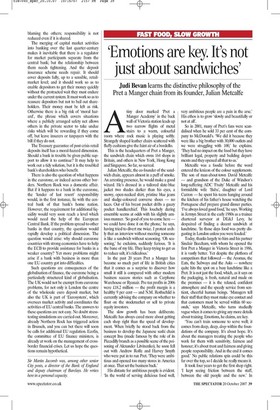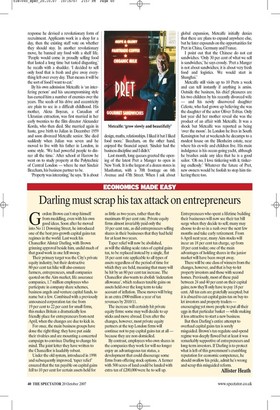'Emotions are key. It's not just about sandwiches'
Judi Bevan learns the distinctive philosophy of the Pret a Manger chain from its founder, Julian Metcalfe Atiny door marked 'Pret a Manger Academy' in the back wall of Victoria station leads up two narrow flights of metal stairs to a warm, colourful room where rock music is playing softly. Strangely shaped leather chairs scattered with fluffy cushions give the faint air of a bordello.
This is the headquarters of Pret a Manger, the sandwich chain which owns 164 shops in Britain, and others in New York, Hong Kong and Singapore. So far, so surreal.
Julian Metcalfe, the co-founder of the sandwich chain, appears almost in a puff of smoke. An arresting presence, he would make a good wizard. He's dressed in a tailored slate-blue jacket two shades darker than his eyes, a snowy, open-necked shirt, pristine blue jeans and sludge-coloured converse shoes — no laces. Out of his breast pocket drifts a gauzy pocket handkerchief. This louchely daring ensemble seems at odds with his slightly anxious manner. `So good of you to come here — we could have done it on the phone,' he says, having tried to divert me twice. I protest archly that an interview without meeting someone is like a sandwich without seasoning. 'Oh seasoning,' he exclaims, suddenly furious. 'It is the bane of my life. They keep trying to get us to reduce salt, it's ridiculous.'
In the past 20 years Pret a Manger has become so much part of life in British cities that it comes as a surprise to discover how small it still is compared with other modern business success stories such as Carphone Warehouse or Ryanair. Pre-tax profits in 2006 were £182 million — the profit margin is a healthy 9 per cent — and N.M. Rothschild is currently advising the company on whether to float on the stockmarket or sell to private equity investors.
The slow growth has been deliberate. Metcalfe has always cared more about getting each shop right than the speed of development. When briefly he stood back from the business to develop the Japanese sushi chain concept Itsu (made famous by the role of its Piccadilly branch as a possible scene of the poisoning of Alexander Litvinenko), he soon fell out with Andrew Rolfe and Harvey Smyth who were put in to run Pret. 'They were ambitious and opened too many stores in America at once. That set the business back.'
His distaste for ambitious people is evident. 'In the world of serving delicious food well, very ambitious people are a pain in the arse.' His ethos is to grow 'slowly and beautifully or not at all'.
So in 2001, many of Pret's fans were scandalised when he sold 33 per cent of the company to McDonald's. 'We did it because they were like a big brother with 30,000 outlets and we were struggling with 100,' he explains. 'They had no impact on the food but they have brilliant legal, property and building departments and they opened all that to us.'
Metcalfe was a foodie before the word entered the lexicon of the colour supplements. The son of man-about-town David Metcalfe — and grandson of the Duke of Windsor's long-suffering ADC 'Fruity' Metcalfe and his formidable wife 'Baba', daughter of Lord Curzon — he spent his teens hanging around the kitchen of his father's house watching the Portuguese chef prepare grand dinner parties. 'I've always loved good food,' he says. Working in Jermyn Street in the early 1980s as a trainee chartered surveyor at DE&J Levy, he despaired of finding a decent sandwich at lunchtime. 'In those days food was pretty disgusting in London unless you were loaded.'
Today, thanks largely to him and his partner Sinclair Beecham, with whom he opened the first Pret a Manger in Victoria Street in 1986, it is vastly better. Yet despite the plethora of competitors that followed — the Aromas, the Eats, the Subways and the Asks — nowhere quite hits the spot on a busy lunchtime like a Pret. It is not just the food, which, as it says on the packaging, is fresh, natural and made on the premises — it is the relaxed, confident atmosphere and the speedy service from sentient, cheerful human beings 'Managers tell their staff that they must make eye contact and that customers must be served within 60 seconds,' says Metcalfe, who turns studiedly vague when it comes to giving any more details about training. Emotions, he claims, are key.
'You can't train someone to serve well; it comes from deep, deep, deep within the foundations of the company. It's about hope. It's about the managers treating the people who work for them with sensitivity, fairness and honour; it's about trust and fairness and giving people responsibility. And in the end it comes good.' No public relations spin could be this far over the top, so I decide he really means it.
It took four years to get the first shop right. 'I kept seeing friction between the staff, between the old people and the new.' In response he devised a revolutionary form of recruitment. Applicants work in a shop for a day, then the existing staff vote on whether they should stay. In another revolutionary move, he banned any food with a shelf life. 'People would come in proudly selling food that lasted a long time but tasted disgusting,' he recalls with a shudder. 'I decided to sell only food that is fresh and give away everything left over every day. That means it will be the sort of food I want to eat.'
By his own admission Metcalfe is 'an interfering person' and his uncompromising style has earned him a number of enemies over the years. The seeds of his drive and eccentricity are plain to see in a difficult childhood. His mother, Alexa Boycun, a Canadian of Ukranian extraction, was first married in her early twenties to the film director Alexander Korda, who then died. She married again in haste, gave birth to Julian in December 1959 and soon divorced Metcalfe senior. She died suddenly when Julian was seven and he moved to live with his father in London, in some style. 'We had powerful people to dinner all the time.' After school at Harrow he went on to study property at the Polytechnic of Central London — where he met Sinclair Beecham, his business partner to be.
'Property was interesting,' he says. 'It is about design, maths, relationships. Hiked it but I liked food more.' Beecham, on the other hand, enjoyed the financial aspect. 'Sinclair had the business discipline and I didn't' Last month, long queues greeted the opening of the latest Pret a Manger to open in New York. It is the largest of a dozen stores in Manhattan, with a 70ft frontage on 6th Avenue and 47th Street. When I ask about global expansion, Metcalfe initially denies that there are plans to expand anywhere else, but he later expounds on the opportunities for Pret in China, Germany and France.
I point out that the Chinese do not eat sandwiches. 'Only 30 per cent of what we sell is sandwiches,' he says crossly. 'Pret a Manger is not about sandwiches; it is about very fresh food and logistics. We would start in Shanghai.'
Metcalfe still visits up to 10 Prets a week and can tell instantly if anything is amiss. Outside the business, his chief pleasures are his two children by his recently divorced wife — and his newly discovered daughter Celeste, who had grown up believing she was the daughter of the actor Oliver Tobias. Only last year did her mother reveal she was the product of an affair with Metcalfe. It was a shock but Metcalfe was reported as being 'over the moon'. In London he lives in South Kensington but at weekends he decamps to a modest house on the Blenheim estate, near where his ex-wife and children live. His main indulgence is his ocean-going yacht, although he brushes aside any idea that he is a good sailor. 'Oh no, I love tinkering with it, tinkering endlessly.' Whatever the future of Pret, new owners would be foolish to stop him tinkering there too.








































































 Previous page
Previous page